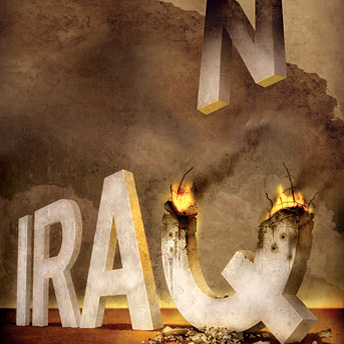Obama's Iran policy is paving a path to war
 Last week saw the publication of two editorials warning about the unintended consequences of Obama’s Iran policy. One has to wonder whether they received the attention they deserve while many people were enjoying their holidays. In any case, former Nixon adviser and National Interest publisher Dimitri K. Simes skewered Obama’s foreign policy while noting that increasing punitive measures against Iran may cause it to respond militarily:
Last week saw the publication of two editorials warning about the unintended consequences of Obama’s Iran policy. One has to wonder whether they received the attention they deserve while many people were enjoying their holidays. In any case, former Nixon adviser and National Interest publisher Dimitri K. Simes skewered Obama’s foreign policy while noting that increasing punitive measures against Iran may cause it to respond militarily:
Particularly serious is Obama’s uncertain handling of the Iranian nuclear challenge. The dialogue with Tehran has not worked so far, and there is no evidence that the administration made a full-scale effort to make it happen. The sanctions did not change the Iranian determination to continue with a nuclear-enrichment program. Increasing the severity of the sanctions, as the administration is planning to do (with full Congressional support), may cause Iran to respond with drastic measures. Remember how Japan responded to American sanctions seventy years ago by attacking Pearl Harbor.
Simes also noted some of the devastating consequences of war such as a “dramatic increase in oil prices, possibly even triggering a global recession” and Iran gaining “powerful new allies who would be willing and able to help rebuild its defenses and restart its nuclear program.”
He does not specify exactly what he is referring to when he ends by noting that the U.S. should freely pursue its own interests when they do not coincide with Israel’s, but considering his focus on the pro-Israel hawkishness of the GOP candidates, it’s fair to assume that he’s talking about Israeli influence over the U.S.’s Iran policy:
We should respect the Israeli attitude, developed after many decades of amazing success in building and protecting their state in a hostile neighborhood. But precisely because Israel is a genuinely independent state with its own important interests, those running for president cannot responsibly claim that there should never be a difference between American and Israeli positions. If such a difference does exist, the United States should be fully entitled, within reason and decency, to act to protect U.S. interests. As George Washington stated in his Farewell Address, “nothing is more essential than that permanent, inveterate antipathies against particular nations, and passionate attachments for others, should be excluded.” Washington also warned that an unconditional attachment to a foreign nation is “particularly alarming to the truly enlightened and independent patriot.”
On the same day that the National Interest piece was published a rare set of hopeful antiwar voices also graced the pages of the Washington Post in an op-ed by Ambassadors William H. Luers and Thomas R. Pickering. The two Cold War diplomatic veterans urged for engagement and diplomacy with Iran at a time when tensions are high and hawkish rhetoric is rampant in Washington. Iran may be a “serious threat”, but “[w]ithout that patient search for different ways to deal with Tehran” the U.S. will be “stuck” with a policy that will not change Iran’s behavior and could lead to a “catastrophic war,” the Ambassadors warn. Like retired Admiral Mike Mullen, Luers and Pickering recommend opening channels of communication with Iran “while maintaining some pressure” to “reduce the danger of conflict.” Of course, that will be especially difficult now due to a provision proposed by Rep. Ileana Ros-Lehtinen in the newly passed Iran Threat Reductions Act which bars communication between U.S. and Iranian officials unless the President notifies Congress fifteen days in advance.
Still, the Obama administration is urged to exhaust the “slow, elusive diplomatic process”. Yet another calamitous war in the Middle East will not serve U.S. interests. Indeed, it will work against them:
Have we forgotten what Iraq and the United States have been through since 2002? Were it not for that ill-begotten war, thousands of Americans (and Iraqis) might still be living. America would be a trillion dollars richer and still be the proud, respected and economically healthy nation the world had known.
En Español
The Latest
 From IPS News
From IPS News- Another Climate Victory in Europe… and Counting
- By Sending Nuclear Weapons to UK, Could US be Fueling Nuclear Proliferation?
- Small Island States Fostering Effective Energy Transition To Achieve a Blue Economy
- Attacks on UNRWA Not About Its Neutrality, Says UNRWA Chief
- US Foreign Policy in Middle East Still Governed by Israeli Priorities
- Rich Nation Hypocrisy Accelerating Global Heating
- Seeking Justice for the Civilian Victims of the Syrian Civil War
- Who Should be the Next UN Leader?PART 7 FINAL
- Will a Two-State Solution include Palestine as a UN Member State?
- UN Live’s CEO Katja Iversen Talks About the Power of Popular Culture and ‘Sounds Right’
- Online fundraising for IPS Inter Press Service at Razoo













